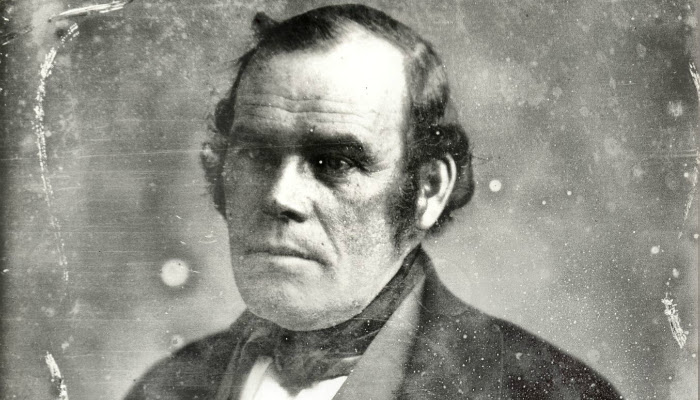
This article by Jamie Armstrong originally appeared in LDSLiving.
In 1844, Parley P. Pratt became the first Mormon to publish a work of LDS fiction. His story, published in newspapers across the U.S. and Europe, defended the Prophet’s character and introduced readers to the important Mormon doctrine of personal revelation.
When asked about LDS fiction, most people immediately think of authors like Gerald Lund, Josi Kilpack, or Dean Hughes. But the history of LDS fiction began over 170 years ago, starting with fledgling LDS members who were attempting to get the word out about Mormon doctrine and beliefs. Parley P. Pratt actively participated in this literary movement in the Church and became the first Mormon to publish a work of LDS fiction.
“A Dialogue Between Joseph Smith & the Devil,” also referred to as “Joe Smith and the Devil,” was first published in the New York Herald in January 1844 after Pratt wrote it one afternoon in Northbridge, Massachusetts. Pratt said of the story, “Visiting North Bridge, a short distance from Boston, and having a day’s leisure, I wrote a dialogue entitled ‘Joe Smith and the Devil,’ which was afterwards published in the New York Herald, and in various papers in America and Europe. It was finally published and republished in pamphlet form, and had a wide circulation; few persons knowing or mistrusting who was the author.”
Pratt’s short story follows a conversation Joseph Smith has with the devil—a conversation that defends the Prophet’s character and explains why the devil despises Joseph Smith but is perfectly happy with other religions. The story begins with the devil handing out fliers that read:
WANTED IMMEDIATELY!
All the liars, swindlers, thieves, robbers, incendiaries, murderers, cheats, adulterers, harlots, blackguards, gamblers, bogus makers, idlers, busy bodies, pickpockets, vagabonds, filthy persons, and all other infidels and rebellious, disorderly persons, for a crusade against Joe Smith and the Mormons! Be quick, be quick, I say or our cause will be ruined and our kingdom overthrown by the d—-d fool of an imposter and his associates, for even now all earth and hell is [sic] in a stew.
Joseph Smith happens to be walking by and inquires why the devil is so upset with him. The devil replies, “You have made more trouble than all the ministers or people of my whole dominion have for ages past. . . . You are causing many persons to think who never thought before, and you would fain put the whole world a thinking, and then where will true religion and piety be? . . . They never will continue to uphold the good old way in which they have jogged along in peace for so many ages, and thus, Mr. Smith, you will overthrow my kingdom and leave me not a foot of ground on earth, and this is the very thing you aim at.”
The devil further explains that contrary to popular belief, he is not opposed to religion but rather embraces it—except for Mormonism. “I am decidedly in favor of all creeds, systems and forms of Christianity, of whatever name and nature,” he says, “so long as they leave out that abominable doctrine which caused me so much trouble in former times, and which, after slumbering for ages, you have again revived; I mean the doctrine of direct communication with God, by new revelation.”
Joseph Smith replies, “With nothing but a few plain, simple weapons of truth and reason, aided by revelation, we boldly make war upon your whole dominion and will never quit the field, dead or alive, till we win the battle, and deprive you of every foot of ground you possess. . . . I shall be prepared to receive those whom you may excite against me, and to give them so warm a reception, that they will never discover your intended falsehood, but will find all your representations of my greatness to be a reality—so do your worst. I defy you.”
In anger, the devil turns to leave, but then changes his mind. “What is the use of parting enemies?” he says. “The fact is, you go in for the wheat and I for the tares. Both must be harvested; are we not fellow laborers? I can make no use of the wheat, nor you of the tares even if we had them; we each claim our own, I for the burning, you for the barn. Come then, give the poor old Devil his due, and let’s be friends.”
The Prophet agrees, and they shake hands. “I neither want yours, nor you mine—a man free from prejudice will give the Devil his due,” Joseph Smith says. “Come, here is the right hand of fellowship. You to the tares, and I to the wheat.”
With their new understanding, the story concludes with the devil and Joseph Smith toasting one another.
“Here’s to my good friend, Joe Smith,” the devil says. “May all sorts of ill-luck befall him, and may he never be suffered to enter my kingdom, either in time or eternity, for he would almost make me forget that I am a devil, and make a gentleman of me, while he gently overthrows my government at the same time that he wins my friendship.”
The Prophet replies, “Here to his Satanic Majesty; may he be driven from the earth and be forced to put to sea in a stone canoe with an iron paddle, and may the canoe sink, and a shark swallow the canoe and its royal freight and an alligator swallow the shark and may the alligator be bound in the northwest corner of hell, the door be locked, key lost, and a blind man hunting for it.”


 Watch a video about the restoration of the gospel on lds.org
Watch a video about the restoration of the gospel on lds.org